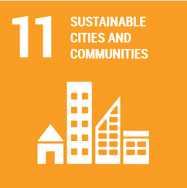Sustainable Development Goal 11. Sustainable cities and communities

Goal 11: Make cities and human settlements inclusive, safe, resilient and sustainable
SDG 11 seeks to make cities more inclusive, safe, resilient and sustainable.
This means guaranteeing access for all to adequate housing and basic services; assuring accessible and sustainable urbanisation and transport, and safeguarding the world's cultural and natural heritage, among other targets.
Today, more than half the world’s population lives in cities.
By 2030, it is projected that 6 in 10 people will be urban dwellers.
Despite numerous planning challenges, cities offer more efficient economies of scale on many levels, including the provision of goods, services and transportation.
With sound, risk-informed planning and management, cities can become incubators for innovation and growth and drivers of sustainable development. almost the entire world population lives in an area covered by a mobile network.
- As COP26 – one of the most important climate conferences in history – ended, a new generation of cities leading from the front on climate change emerged.
- 95 cities (up from 88 cities in 2020) are named on this year’s A List as bold leaders in environmental transparency and action, with almost half (46 cities) being new for 2021.
- To score an A, among other actions, a city must disclose publicly and have a city-wide emissions inventory, have set an emissions reduction target and a renewable energy target for the future; and have published a climate action plan.
- An A List city must also complete a climate risk and vulnerability assessment and have a climate adaptation plan to demonstrate how it will tackle climate hazards.
- And it must be making progress towards achieving its ambitious but realistic goals.
11.1. SAFE AND AFFORDABLE HOUSING
By 2030, ensure access for all to adequate, safe and affordable housing and basic services and upgrade slums.
11.2. AFFORDABLE AND SUSTAINABLE TRANSPORT SYSTEMS
By 2030, provide access to safe, affordable, accessible and sustainable transport systems for all, improving road safety, notably by expanding public transport, with special attention to the needs of those in vulnerable situations, women, children, persons with disabilities and older persons.
11.3. INCLUSIVE AND SUSTAINABLE URBANIZATION
By 2030, enhance inclusive and sustainable urbanization and capacity for participatory, integrated and sustainable human settlement planning and management in all countries.
11.4. PROTECT THE WORLD’S CULTURAL AND NATURAL HERITAGE
Strengthen efforts to protect and safeguard the world’s cultural and natural heritage.
11.5. REDUCE THE ADVERSE EFFECTS OF NATURAL DISASTERS
By 2030, significantly reduce the number of deaths and the number of people affected and substantially decrease the direct economic losses relative to global gross domestic product caused by disasters, including water-related disasters, with a focus on protecting the poor and people in vulnerable situations.
11.6. REDUCE THE ENVIRONMENTAL IMPACT OF CITIES
By 2030, reduce the adverse per capita environmental impact of cities, including by paying special attention to air quality and municipal and other waste management.
11.7. PROVIDE ACCESS TO SAFE AND INCLUSIVE GREEN AND PUBLIC SPACES
By 2030, provide universal access to safe, inclusive and accessible, green and public spaces, in particular for women and children, older persons and persons with disabilities.
11.8. STRONG NATIONAL AND REGIONAL DEVELOPMENT PLANNING
Support positive economic, social and environmental links between urban, peri-urban and rural areas by strengthening national and regional development planning.
11.9. IMPLEMENT POLICIES FOR INCLUSION, RESOURCE EFFICIENCY AND DISASTER RISK REDUCTION
By 2020, substantially increase the number of cities and human settlements adopting and implementing integrated policies and plans towards inclusion, resource efficiency, mitigation and adaptation to climate change, resilience to disasters, and develop and implement, in line with the Sendai Framework for Disaster Risk Reduction 2015–2030, holistic disaster risk management at all levels.
11.10. SUPPORT LEAST DEVELOPED COUNTRIES IN SUSTAINABLE AND RESILIENT BUILDING
Support least developed countries, including through financial and technical assistance, in building sustainable and resilient buildings utilizing local materials.
Find a Goal 11 charity you want to support. Any donation, big or small, can make a difference!
Support a project in slums for safe housing. You can volunteer in slums to help with building houses, fixing existing ones, setting up public or green spaces.
Shop, eat and drink locally. Supporting neighbourhood businesses keeps people employed and circulates money back into your community.
Take advantage of your right to elect the leaders in your local community.
Commute in a sustainable way – bike, walk or take public transport. Save the car trips for when you’ve got a big group.
Take care of public spaces. Start yourself and inspire others to contribute to better public spaces – water the greenery, trim and plant trees, renovate sports areas and playgrounds, organize a cleanup.












